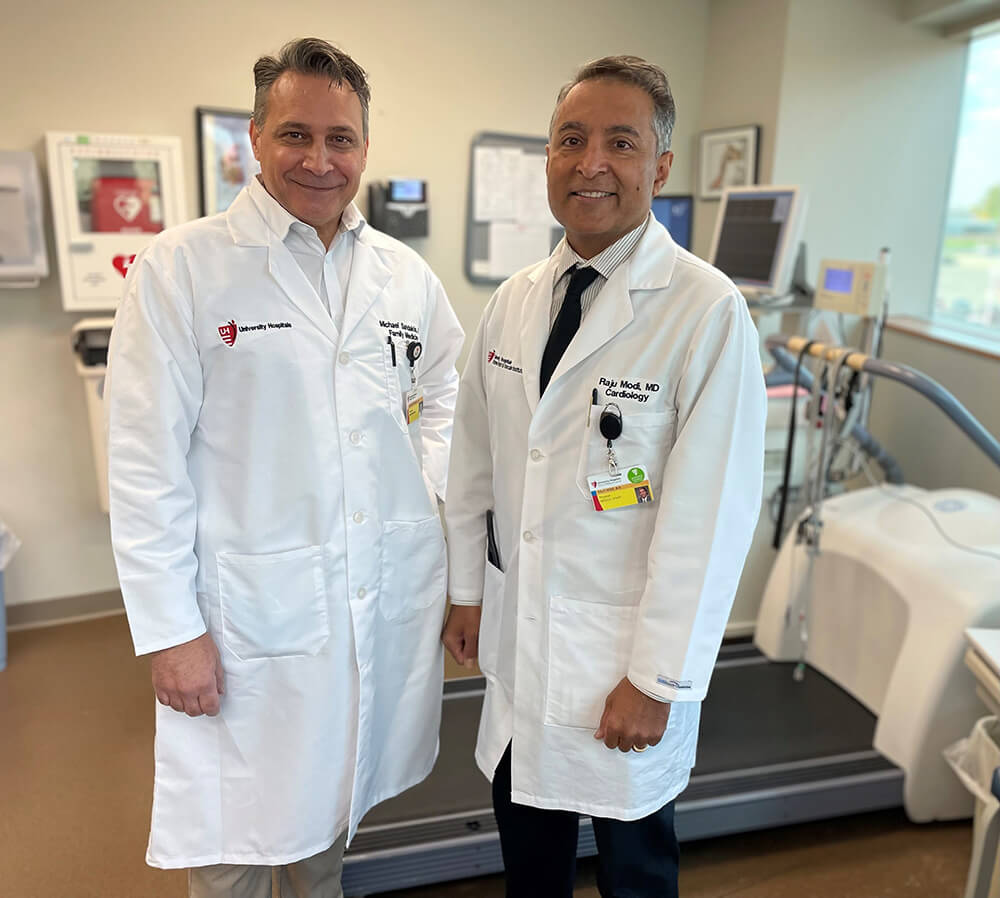Partners in Care: Strong relationships between primary care and specialists benefit patients
November 15, 2022
Knowing when to call a trusted physician isn’t just important for patients. It applies to doctors as well.
Primary care physicians appreciate knowing they have ready access to the cardiologists and specialists of University Hospitals Harrington Heart & Vascular Institute. And those same cardiac and vascular physicians know that primary care is a vital partner in managing chronic conditions and routine health screenings.
Sometimes basic testing doesn’t satisfy a physician who has a hunch there is an underlying health problem. Consider an active man in his 30s who has low blood pressure and cholesterol and an unremarkable physical exam. But his brother and father both collapsed of heart attacks in their 40s. UH Family Medicine physician Michael Saridakis, DO, ordered a coronary calcium score – a test offered at no cost by UH to determine future risk of heart attack.
The calcium score showed the man was in the 99th percentile for heart attack risk. Dr. Saridakis referred the man to cardiologist Raju Modi, MD, a trusted colleague, who performed a cardiac catheterization and discovered a serious occlusion in his left anterior descending artery (LAD) – also known as the “widowmaker,” because when plaque ruptures, it often leads to sudden death.
 Michael Saridakis, DO and Raju Modi, MD
Michael Saridakis, DO and Raju Modi, MD“I know specialists are busy, but I also know when I have to trust my instincts to reach out,” says Dr. Saridakis, who appreciates that Dr. Modi can be reached quickly by a secure text. “We totally appreciate the ability to contact these cardiologists and get access quickly.”
Sometimes a long-term relationship between the physician and the patient moves the doctor to delve deeper. Dr. Saridakis recalls a patient he followed for more than a decade who frequently complained of being tired. On one visit, the morbidly obese patient said he was even more fatigued than normal, a point that might be overlooked if he hadn’t known the man for years. The patient’s physical exam, bloodwork and a chest x-ray yielded no warning signs. But Dr. Saridakis still suspected a hidden heart problem. He sent him to Dr. Modi for a stress test with an EKG.
Dr. Modi discovered the patient had cardiomyopathy, or a weakened heart muscle.
“While we always want to be judicious about testing so as not to get a false positive, as experienced clinicians, we need to know what we don’t know,” Dr. Modi said. “Mike’s concern prompted me to look further. The valuable part of medicine is clinical judgment, which sometimes supersedes what any test shows.
“All I ever need to hear from another physician is ‘I’m concerned.’ And when I refer a patient, what I want to hear is ‘I’ll take care of it.’
The relationship works in both directions. When Dr. Modi encounters patients who regularly see their cardiologist but are failing to see a PCP for chronic health problems like diabetes or depression, or obtain cancer screenings despite a strong family history, he helps them establish a PCP and sends them to physicians like Dr. Saridakis.
Dr. Modi serves as Director of Ambulatory Services for UH Harrington Heart & Vascular Institute throughout seven counties across Northeast Ohio.
“We have worked stridently for three years to create better access for our patients,” says Dr. Modi.
Access is important for physicians, too, who detect problems that require a specialist’s expertise and treatment.
“UH is amazing,” Dr. Modi added. “I can talk to any number of world experts when I need their insight. The collegiality and friendship goes a long way toward benefitting patients.”


